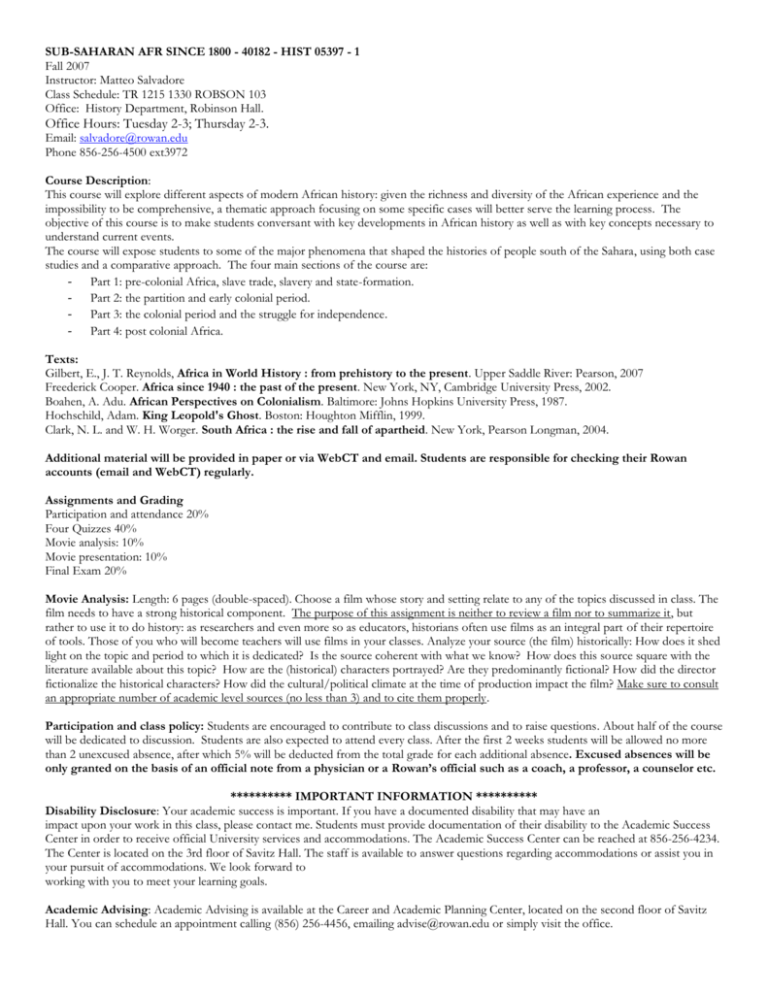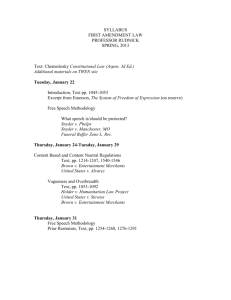
SUB-SAHARAN AFR SINCE 1800 - 40182 - HIST 05397 - 1
Fall 2007
Instructor: Matteo Salvadore
Class Schedule: TR 1215 1330 ROBSON 103
Office: History Department, Robinson Hall.
Office Hours: Tuesday 2-3; Thursday 2-3.
Email: salvadore@rowan.edu
Phone 856-256-4500 ext3972
Course Description:
This course will explore different aspects of modern African history: given the richness and diversity of the African experience and the
impossibility to be comprehensive, a thematic approach focusing on some specific cases will better serve the learning process. The
objective of this course is to make students conversant with key developments in African history as well as with key concepts necessary to
understand current events.
The course will expose students to some of the major phenomena that shaped the histories of people south of the Sahara, using both case
studies and a comparative approach. The four main sections of the course are:
- Part 1: pre-colonial Africa, slave trade, slavery and state-formation.
- Part 2: the partition and early colonial period.
- Part 3: the colonial period and the struggle for independence.
- Part 4: post colonial Africa.
Texts:
Gilbert, E., J. T. Reynolds, Africa in World History : from prehistory to the present. Upper Saddle River: Pearson, 2007
Freederick Cooper. Africa since 1940 : the past of the present. New York, NY, Cambridge University Press, 2002.
Boahen, A. Adu. African Perspectives on Colonialism. Baltimore: Johns Hopkins University Press, 1987.
Hochschild, Adam. King Leopold's Ghost. Boston: Houghton Mifflin, 1999.
Clark, N. L. and W. H. Worger. South Africa : the rise and fall of apartheid. New York, Pearson Longman, 2004.
Additional material will be provided in paper or via WebCT and email. Students are responsible for checking their Rowan
accounts (email and WebCT) regularly.
Assignments and Grading
Participation and attendance 20%
Four Quizzes 40%
Movie analysis: 10%
Movie presentation: 10%
Final Exam 20%
Movie Analysis: Length: 6 pages (double-spaced). Choose a film whose story and setting relate to any of the topics discussed in class. The
film needs to have a strong historical component. The purpose of this assignment is neither to review a film nor to summarize it, but
rather to use it to do history: as researchers and even more so as educators, historians often use films as an integral part of their repertoire
of tools. Those of you who will become teachers will use films in your classes. Analyze your source (the film) historically: How does it shed
light on the topic and period to which it is dedicated? Is the source coherent with what we know? How does this source square with the
literature available about this topic? How are the (historical) characters portrayed? Are they predominantly fictional? How did the director
fictionalize the historical characters? How did the cultural/political climate at the time of production impact the film? Make sure to consult
an appropriate number of academic level sources (no less than 3) and to cite them properly.
Participation and class policy: Students are encouraged to contribute to class discussions and to raise questions. About half of the course
will be dedicated to discussion. Students are also expected to attend every class. After the first 2 weeks students will be allowed no more
than 2 unexcused absence, after which 5% will be deducted from the total grade for each additional absence. Excused absences will be
only granted on the basis of an official note from a physician or a Rowan’s official such as a coach, a professor, a counselor etc.
********** IMPORTANT INFORMATION **********
Disability Disclosure: Your academic success is important. If you have a documented disability that may have an
impact upon your work in this class, please contact me. Students must provide documentation of their disability to the Academic Success
Center in order to receive official University services and accommodations. The Academic Success Center can be reached at 856-256-4234.
The Center is located on the 3rd floor of Savitz Hall. The staff is available to answer questions regarding accommodations or assist you in
your pursuit of accommodations. We look forward to
working with you to meet your learning goals.
Academic Advising: Academic Advising is available at the Career and Academic Planning Center, located on the second floor of Savitz
Hall. You can schedule an appointment calling (856) 256-4456, emailing advise@rowan.edu or simply visit the office.
Plagiarism: Plagiarism is the unacknowledged use of another person's labor, another person's ideas, another person's words, another
person's assistance. Normally, all work done for courses -- papers, examinations, homework exercises, laboratory reports, oral presentations
-- is expected to be the individual effort of the student presenting the work. Any assistance must be reported to the instructor. If the work
has entailed consulting other resources -- journals, books, or other media -- these resources must be cited in a manner appropriate to the
course. It is the instructor's responsibility to indicate the appropriate manner of citation. Failure to cite borrowed material constitutes
plagiarism. Undocumented use of materials from the World Wide Web is plagiarism. For a more exhaustive explanation see the
Department’s website at the following address:
http://www.rowan.edu/history/plagiarism.html
A plagiarized paper will automatically receive an F even when the plagiarism interests only a fraction of the paper. A student
caught plagiarizing will automatically be considered only for a final grade equal or lower than a C- and his/her conduct
reported to the Department.
Academic freedom: Freedom to teach and freedom to learn are inseparable facets of academic freedom. The freedom to learn depends
upon appropriate opportunities and conditions in the classroom, on the campus, and in the larger community. The University and the
faculty have a responsibility to provide students with opportunities and protections that promote the learning process in all its aspects.
Students similarly should exercise their freedom with responsibility.
Writing assistance: Good writing skills are essential to your success in this class. Writing assistance is available at two different centers:
- Writing Center: sponsored by the Writing Arts Department, it offers help at two locations: the Writing Lab in Bozorth Hall 26 and at the
Writing Lab Outpost 1 in the Campbell Library Resource Room. Assistance is available on a drop-in basis.
- Academic Success Center in Savitz Hall (3rd floor): the Center offers help with writing as well as other types of tutoring. You may drop in
or contact the coordinator explaining your needs by phone 856-256-4462 or email wilsonbo@rowan.edu.
Schedule
Part I - Before Colonialism
Week 1
Tuesday
Thursday
Week 2
Tuesday
Thursday
Week 3
Tuesday
January 22 - Introduction and Guidance
January 24 - Slavery and the slave trade, state formation, trade and migration.
Gilbert 8
January 29 - Slavery and the slave trade, state formation, trade and migration.
Gilbert 9 and 11 (233-243 only)
January 31 - South Africa before the Scramble.
Gilbert 12
February 05 - African state-building: the Ethiopian case.
Excerpts from Bahru Zewde, A History of Modern Ethiopia, 2004 (WEBCT)
Part II - Confronting Imperialism
Thursday
Week 4
Tuesday
Thursday
Week 5
Tuesday
Thursday
February 07- Test on Part I
Screening: White King, Red Rubber, Black Death.
Hochschild: Introduction and Prologue.
February 12 - The Scramble: case study on the Congo.
Screening: White King, Red Rubber, Black Death.
Hochschild Part I
February 14 - The Scramble: case study on the Congo.
Hochschild Part II.
February 19 - The Scramble for Arica.
Gilbert 13
Boahen, 1 and 2.
February 21 The foundation of South Africa
Material on webct
Test on Part II
Part III Africa under the Colonial System
Week 6
Tuesday
Thursday
Week 7
Tuesday
Thursday
Week 8
Tuesday
Thursday
February 26 - Colonial systems: economy
Gilbert 14
February 28 - Colonial systems: politics and administration.
Gilbert 15
March 04 - Evaluating the colonial period from an African perspective.
Boahen 3 and 4
March 06 – Decolonization.
Gilbert 17
March 11 – Decolonization.
Screening: Lumumba (first part)
Cooper 1,2,3,4.
March 13 – Decolonization.
Screening: Lumumba (second part)
Test on Part III
Part IV Independent Africa
Week 9
Tuesday
Thursday
Week 10
Tuesday
Thursday
Week 11
Tuesday
Thursday
Week 12
Tuesday
Thursday
Week 13
Tuesday
Thursday
Week 14
Tuesday
Thursday
March 25 - MOVIE ANALYSIS PRESENTATION
March 27 - MOVIE ANALYSIS PRESENTATION
MOVIE ANALSYS DUE
April 01 - Postcolonial Economy
Cooper 5
April 03 - Postcolonial State
Cooper 7
April 08 – Late decolonization and the Cold War
Cooper 6
April 10 – Military Coups
Material on WebCT
April 15 – African Marxism
April 17 - Segregation and Apartheid
Clark 1 – 61
April 22 - Challenging and defeating Apartheid
Clark 62 - 120
April 24 – Test on Part IV
April 29 - The Rwandan Genocide
Material on WebCT
May 01 – Sudan’s Civil Wars
Material on WebCT







